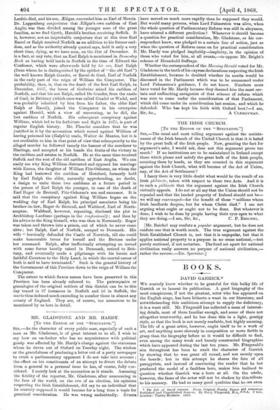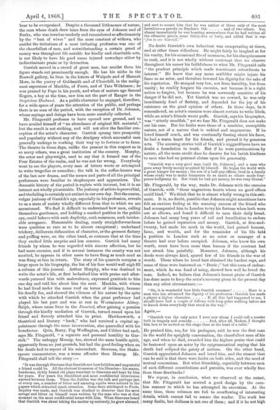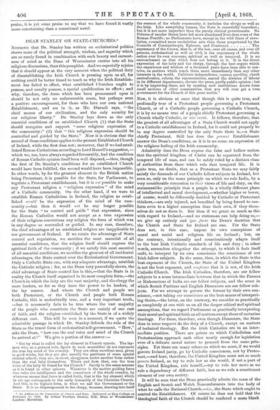BOOKS.
DAVID GARRICK.*
WE scarcely know whether to be grateful for this bulky life of Garrick or to lament its publication. A good biography of the most conspicuous, if not the greatest, actor who has appeared on the English stage, has been hitherto a want in our literature, and notwithstanding this ambitious attempt to supply the deficiency, it is a want still. Mr. Fitzgerald has collected a mass of interest- ing details, most of them familiar enough, and some of them not altogether trustworthy, and he has done this in a light, gossipy style, so that the book is not merely readable, but highly amusing The life of a great artist, however, ought itself to be a work of art, and anything more slovenly in composition or more feeble in grasp than the biography before us it would be difficult to find, even among the many weak and loosely constructed biographies which have appeared during the last ten years. Mr. Fitzgerald's aim throughout has been to exalt the character of Garrick by showing that he was great all round, and not merely upon the boards ; but in this attempt he shares the fate of all panegyrists, and instead of convincing the reader that he has produced the model of a faultless hero, makes him inclined to. question whether Garrick was a hero at all. On the wiole, however, the fame of the actor will not be shaken by this tribute to his memory. He had so many good qualities that he an even • The Life of David Garrick. From Original Family Papers sid numerous Published and Unpublished Sources. By Percy Fitzgerald, M.A., F.S.A. 2 Tole_ London: Tinsley Brothers. 1868.
bear to be overpraised. Despite a thousand littlene,sses of nature, the man whose death drew tears from the eyes of Johnson and of Burke, who was loved so tenderly and remembered so affectionately by the "best of wives" and the most constant of widows, who amidst the irritations of a most irritating profession was one of the cheerfullest of men, and notwithstanding a certain greed of money was throughout life notable for kindly and charitable acts, is not likely to have his good name injured nowadays either by indiscriminate praise or by detraction.
Garrick moved in a crowd of great men, but amidst them his figure stands out prominently enough. He has his niche in the Boswell gallery, he lives in the letters of Walpole and of Hannah More, in the poetry of Goldsmith and of Churchill, in the malig- nant aspersions of Macklin, of Foote, and of Tate Wilkinson ; he
was praised by Pope in his youth, and when of mature age Samuel Rogers, a boy at the time, saw him act the part of Ranger in the Suspicious Husband. As a public character he engaged, therefore, for a wide space of years the attention of the public, and perhaps there is no man of the period, with the exception of Dr. Johnson, whose sayings and doings have been more carefully collected.
Mr. Fitzgerald professes to have opened new ground, and to have availed himself of "an abundance of original MS. material," but the result is not striking, and will not alter the familiar con- ception of the actor's character. Garrick sprang into prosperity and popularity without any of the drudgery which successful men generally undergo in working their way up to fortune or to fame. The theatre in those days, unlike the present in this respect as in so many others, was a great institution of the country. Murphy, the actor and playwright, used to say that it formed one of the Four Estates of the realm, and he was not far wrong. Everybody went to see the players, every man of letters wrote or attempted to write tragedies or comedies ; the talk in the coffee-houses was of the last new drama, and the names and parts of all the principal performers were familiar to shopkeepers and apprentices. The dramatic history of the period is replete with interest, but it is an interest not wholly pleasurable. The jealousy of artists is proverbial, and the failing is certainly not extinct in our own day. But the coarse, vulgar jealousy of Garrick's age, especially in his profession, reveals to us a state of society wholly different from that to which we are accustomed. We find it difficult to understand how men, calling themselves gentlemen, and holding a marked position in the public eye, could behave with such duplicity, such meanness, such intoler- able arrogance. Honourable dealing, manly straightforwardness were qualities so rare as to be almost exceptional ; underhand trickery, deliberate defamation of character, or the grossest flattery and puffing were, on the other hand, so common that at the time they excited little surprise and less censure. Garrick had many friends by whom he was regarded with sincere affection, but he had more enemies, and if in several instances the enmity was not merited, he appears in other cases to have flung as much mud as was flung at him in return. The story of his quarrels occupies a
large space in his biography, the list of his foes would well nigh fill a column of this journal. Arthur Murphy, who was destined to -write the actor's life, at first bedaubed him with praise and after- wards pursued him with malevolence, expressed gratitude to him
one day and told lies about him the next. Macklin, with whom he had lived under the same roof on terms of intimacy, became his deadly foe, and showed the vileness of his nature by the spite with which he attacked Garrick when the great performer had played his last part and was at rest in Westminster Abbey.
Ralph, whose name lives in the Dunciad, after gaining a pension through the kindly mediation of Garrick, turned round upon his
friend and fiercely attacked him in print. Hawkesworth, a theatrical and literary "hack," who had received a capital ap- pointment through the same intervention, also quarrelled with his benefactor. Quin, Barry, Peg Woffington, and Cibber had each, says Mr. Fitzgerald, "a separate and personal hostility to Gar- rick." The unhappy Mossop, too, showed the same hostile spirit, apparently from no just grounds, but had the good feeling when on his death-bed to repent of his misconduct. Steevens, the Shake- speare commentator, was a worse offender than Mossop. Mr. Fitzgerald shall tell the story :—
"It was through Steovens that Garrick saw how faithless and ungrateful a friend could be. All the choicest treasures of his libraries—his scarce, handsome, richly bound old plays were lent to Steevens and kept by him for years. For years the friendliest and most confidential intercourse existed between them. When the Jubilee was the talk and perhaps jest of every one, a number of bitter and amusing squibs were noticed in the papers which attracted much attention. Some were attributed to Foote. Inquiry was made, and Garrick was shocked to discover that the most savage and bitter on himself were written by the man who was at that moment on the most confidential terms with him. When Steevens heard that Garrick was about taking the matter up seriously, he grew alarmed,
and sent to assure him that he was author of three only of the most
harmless—a parody on Dryden's Ode and of two others. Yet, almost immediately he was boasting everywhere that he had written all the offensive pieces, some thirty-five or forty, and added that it was 'fun to vex Garric7c.' "
No doubt Garrick's own behaviour was exasperating at times, and at other times ridiculous. He might fairly be laughed at for his vanity, for his occasional fits of meanness, for his obsequiousness to rank, and it is not wholly without contempt that we observe throughout his career his faithfulness to what Mr. Fitzgerald calls "the prudent principle which made resentment subordinate to interest." He knew that any mean scribbler might injure his fame as an actor, and therefore lowered his dignity for the sake of his reputation. He stooped very low, not from humility, but from vanity ; he readily forgave his enemies, not because it is a right action to forgive, but because he was nervously sensitive of his danger if he did not. Yet Garrick was no coward, he was only inordinately fond of flattery, and depended for the joy of his existence on the good opinion of others. In those days, be it remembered, an actor's enemies were almost certain to write libels, while an actor's friends wrote puffs. Garrick, says his biographer, was "utterly unselfish," yet we fear Mr. Fitzgerald does not make out his case. But his faults were those of a sensitive, susceptible nature, not of a nature that is unkind and ungenerous. If he loved himself much, and was continually fussing about his fame, he had a warm heart for his friends, and proved it by generous acts. The amusing stories told of Garrick's niggardliness have no doubt a foundation in truth. But if he were parsimonious by nature, all the more credit does he deserve for his lavish kindness to men who had no personal claims upon his generosity.
"Garrick was a very good man [said Dr. Johnson], and a man who gave away freely money acquired by himself. He began the world with a great hunger for money ; the son of a half-pay officer, bred in a family whose study was to make fourpenee do as much as others made four- pence-halfpenny do. But when he had got money, he was very liberal."
Mr. Fitzgerald, by the way, ranks Dr. Johnson with the enemies of Garrick, with "those ungracious hearts whom no good offices could bind." We think that he is almost wholly wrong in this esti- mate. It is, no doubt, possible that Johnson might sometimes have felt an envious feeling at the amazing success of the friend who had accompanied him to London to try his fortune when both were out at elbows, and found it difficult to earn their daily bread. Johnson had many long years of toil and humiliation to endure before he gained reputation and money. Garrick, at five-and- twenty, had made his mark in the world, had gained honour, fame, and wealth, and for the remainder of his life held a position in London such as no actor or manager of a theatre had ever before occupied. Johnson, who knew his own worth, must have been more than human if the contrast had not struck him painfully. Moreover, Johnson, although his deeds were always kind, spared few of his friends in the war of words. Those whom he loved best obtained the hardest raps, and some of these were bestowed on "Davie ;" but this term of endear- ment, which he was fond of using, showed how well he loved the man. Indeed, we believe that Johnson's honest praise of Garrick has done more to keep the actor's memory green in the present day than any other circumstance :— " Sir, it is wonderful how little Garrick assumes Here is a
man who has advanced the dignity of his profession : Garrick has made • a player a higher character If all this had happened to me, I should have had a couple of fellows with long poles walking before me to knock down everybody that stood in the way."
Again,— " Garrick was the only actor I ever saw whom I could call a master both in tragedy and comedy And, after all, Madam, I thought him less to be envied on the stage than at the head of a table."
He praised him, too, for his prologues, said he was the first man in the world for sprightly conversation, the cheerfullest man of his age, and when he died, awarded him the highest praise that could be bestowed upon an actor by the epigrammatical saying that his death had eclipsed the gaiety of nations. On the other hand, Garrick appreciated Johnson and loved him, and the utmost that can be said is that there were faults on both sides, and the need of mutual concessions. But what friendship, especially between men of such different constitutions and pursuits, was ever wholly free from these drawbacks?
We repeat, in conclusion, what we observed at the outset, that Mr. Fitzgerald has marred a good design by the care- less manner in which he has attempted its execution. At the same time, these volumes are full to overflowing of interesting details, which cannot fail to amuse the reader. The work has many faults, but dullness is not one of them ; and if it be not high
praise, it is yet some praise to say that we have found it vastly more entertaining than a sensational novel.
































 Previous page
Previous page